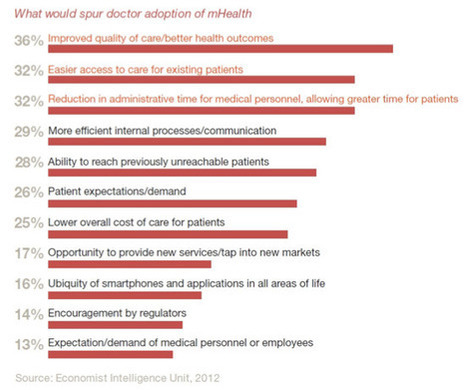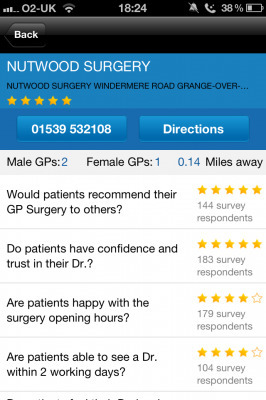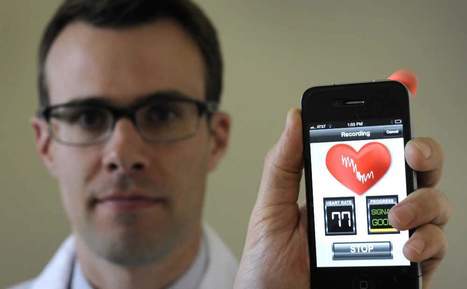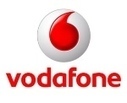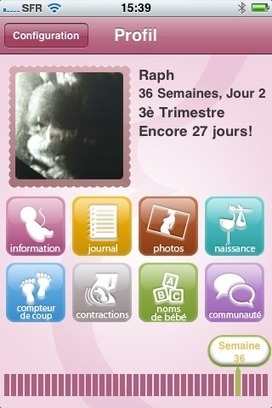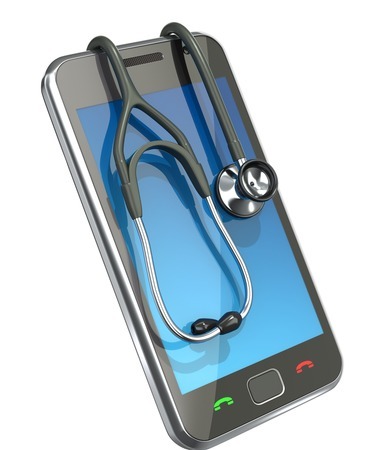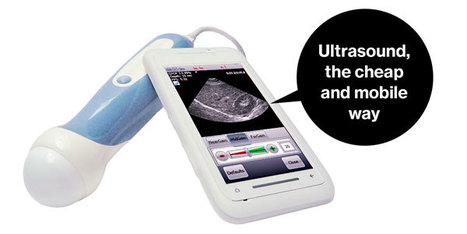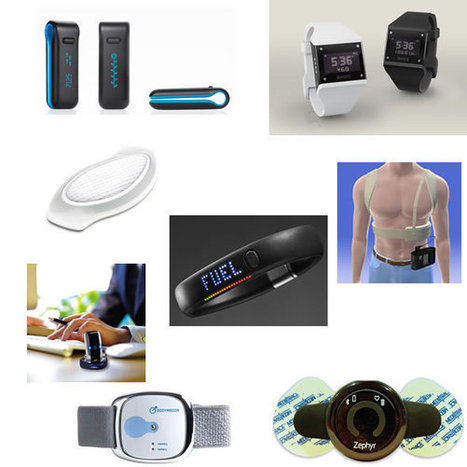 Your new post is loading...
 Your new post is loading...
Véritable laboratoire d'analyses de poche, il est doté de capteurs permettant de pratiquer soi-même des tests médicaux pour suivre son état de santé.
This week Happtique, the healthcare-specific appstore and mobile app prescription technology vendor, published its draft document for the mobile health app certification process its panel of advisors has been developing over the course of the past...
Samsung Electonics a annoncé le lancement de S health, une application mobile qui permet de surveiller efficacement le taux de sucre dans le sang, la tension, et le poids, en même temps que son nouveau produit phare, le Galaxy SIII, le 2 juillet.
Via dbtmobile, Lionel Reichardt / le Pharmageek
Do you get the feeling apps are getting dumber? They are, and that’s a good thing. Behind the surprising simplicity of some of today’s top apps, smart developers are realizing that they’re able to get users to do more by doing less.
While many people feel the move to mobile health may be simply a fad, I believe it will become the new normal in healthcare. Here’s why: #1 Hospitals are all about motion
Have you ever been to a hospital where everyone and everything wasn’t in constant motion? Patients, clinicians and equipment; everything is always on the move and in a hurry! But for the past few decades, we have designed technologies that require the user to sit and type at a workstation. At rest is not the natural state of a hospital. It also radically alters the natural workflows of everyone who must use these tethered systems. Mobile Health is the natural solution to this problem. It allows clinicians, clerks, maintenance, housekeeping and everyone else to stay on the move and still leverage all the benefits of technology.
#2 Physicians and nurses are in short supply
So is their time. It’s important to ensure that their time and efforts are maximized. Giving them the tools they need to care for more patients and provide better quality care is the key. Why is this important? Retention. While these have always been stressful occupations, the past several years have placed a greater and greater burden on fewer and fewer people in these roles. Making their workday more satisfying and less stressful benefits everyone.
#3 Patient engagement
The opportunities presented with mobile Health to innovate and re-imagine patient engagement not only between clinician and patient but also between the patient and their own health data is unprecedented. Home care, remote patient monitoring, adherence, tele-medicine, PHRs, prescribed apps, the list of opportunities is endless.
#4 Time
Untethering nurses from the nursing station allows them to spend more time providing quality and personal care at the bedside. Delivering results directly to clinicians via mobile devices may save critical time delays for providing a diagnosis to save a life. Mobile Health when implemented correctly should provide a return on time that can be invested in care. Speeding up technology allows clinicians to slow down, think, communicate and engage more often and more effectively.
Via nrip, dbtmobile, Lionel Reichardt / le Pharmageek
There may be 12,000 apps out there but they’re not 12,000 good apps,” Chris Wasden, Global Healthcare Innovation Leader for PwC, said at the MedCity Converge health tech conference Tuesday.
Avec l’arrivée en masse des smartphones et des tablettes dans les foyers, une nouvelle manière de consommer a fait son apparition. Désormais connectés et mobiles, les consommateurs ont adopté de nouveaux modes d’achat.
Cabinet de services financiers, de conseil et expertise technique, PwC vous accompagne dans l’audit et la certification des comptes de votre entreprise.
Skepticism about new technology is expected and healthy. It should not be blindly defended by its developers or investors. (Of course, not! But what do you think?
|
This is an article that discusses whether mobile health apps present an opportunity for the pharma industry. (Are mobile apps an opportunity for pharma?
Despite exuberance in the technology community, there is much resistance in the medical community about the adoption of medical apps for prescribing.
When it comes to patient education apps, physicians have a great selection. There are apps such as the Orca Health Decide series or the DrawMD visual education app series. Some patient education apps are not focused on diseases or conditions but rather on the range and accessibility of services available to the user. GP Ratings is the first app of this kind specifically for the UK which takes advantage of the recent GP patient survey conducted by the The UK Department of Health. The app is designed to assist would be patients see ratings of their local GP surgery as deemed by information collected in a recent nationwide government study. The app contains detailed ratings for the 8,300 surgeries in England. On average each surgery has 130 survey respondents for each of the questions below. The measures are: * Would patients recommend their GP Surgery to others?
* Are patients able to see a Doctor within 2 working days?
* Are patients satisfied with their ability to see a preferred Doctor?
* Are patients satisfied with the care they received?
* Do patients have confidence and trust in their Doctor?
* Do patients feel their Doctor involves them in decisions about their care?
* Are patients happy with the surgery opening hours? The data is converted into a star rating so it’s easy to interpret. An average of these ratings is then taken and compared nationally to give an overall star rating. Upon entering the app, each user is prompted to enter their postcode or alternatively search by GPS.
New app helps doctors, patients avoid 'he-said-she-said' moments http://t.co/QrGG5Gxn #mhealth #hcsm...
Take Home: UMass Medical School and WPI have developed an app that can detect atrial fibrillation. This moves connected and mobile health closer to reality. The really important development with this approch might allow us to treat patients who have AF intermittently (paroxysmal) differently than we currently do. Because we are worried about stroke, patietns now get blood thinners all the time because we are concerned that they will have recurrences without knowing about it. With this technology, in the future, we might see validation of a strategy that allows use of blood thinners when patients are in AF only, sometimes called a pill in the pocket.
Via Seth Bilazarian, MD, Lionel Reichardt / le Pharmageek
There may be 12,000 apps out there but they’re not 12,000 good apps,” Chris Wasden, Global Healthcare Innovation Leader for PwC, said at the MedCity Converge health tech conference Tuesday. “They’re mostly bad apps that people rarely use.” Aside from the issues with the apps themselves, he said recent research conducted by PwC found that even though patients are eager to adopt mobile health, doctors and the larger system surrounding them are reluctant to change things up. “Consumers are demanding it,” he said. “Doctors see mobile healthcare being much more transformative and disruptive to their practice. This transformation and disruption is so painful that they’re very resistant to doing those changes.”
Orange Business Service a créé une infographie sur l’avenir de la m-santé. Découverte. Cette infographie s’intéresse aux différentes connexions entre la technologie mobile et l’un...
RT @BlogDeLaSante: Baby Bump : application iphone de suivi de grossesse: http://t.co/yZZ5mj9F #iphone #bébé #grossesse #santé...
The world is experiencing a revolution in healthcare. The exponential growth of mobile communications, not only in developed countries but also in the developing world, combined with increasing innovation in harnessing the power of mobile technologies,...
Wireless sensor technology developed by the University of Missouri can measure subtle changes in pulse, respiration, and bed restlessness, warning clinicians of the early onset of pneumonia or other life-threatening problems.
Via uri goren, Lionel Reichardt / le Pharmageek
|




 Your new post is loading...
Your new post is loading...


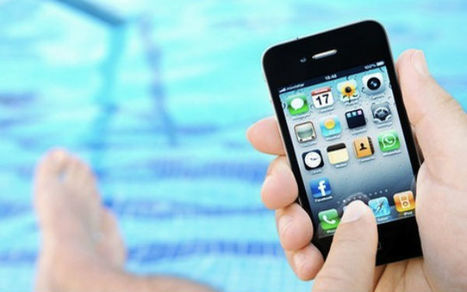
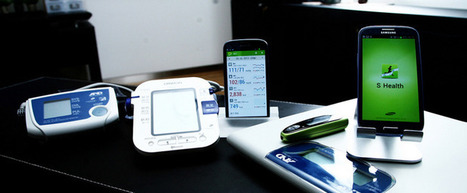
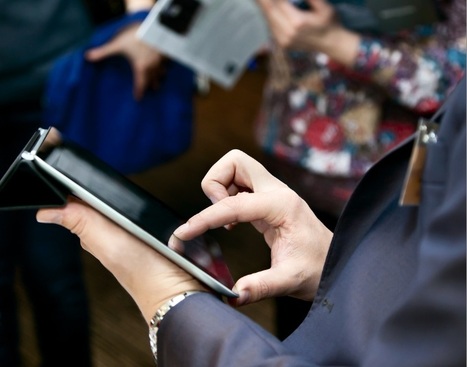
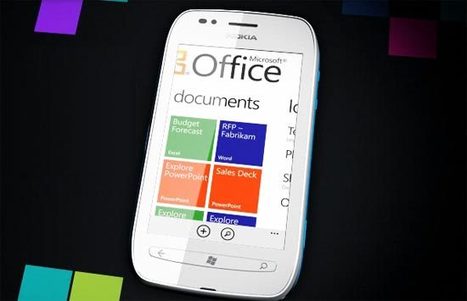
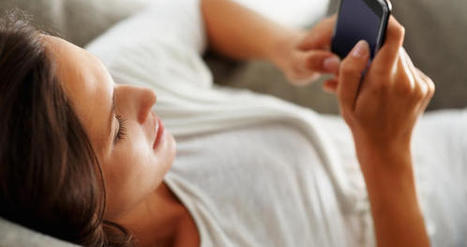
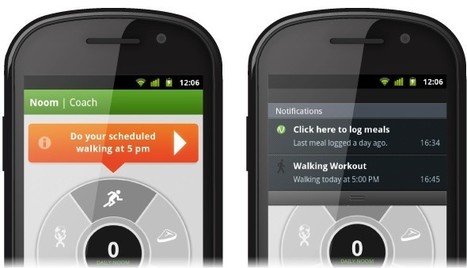
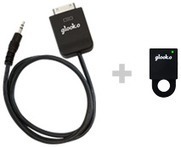
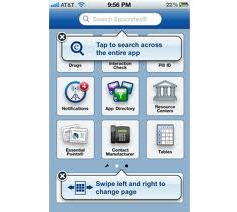
![[Infographie] Les magasins face aux défis du mobile | M-HEALTH By PHARMAGEEK | Scoop.it](https://img.scoop.it/a_8YRwUMKg4wzT-Seqfk8jl72eJkfbmt4t8yenImKBVvK0kTmF0xjctABnaLJIm9)
